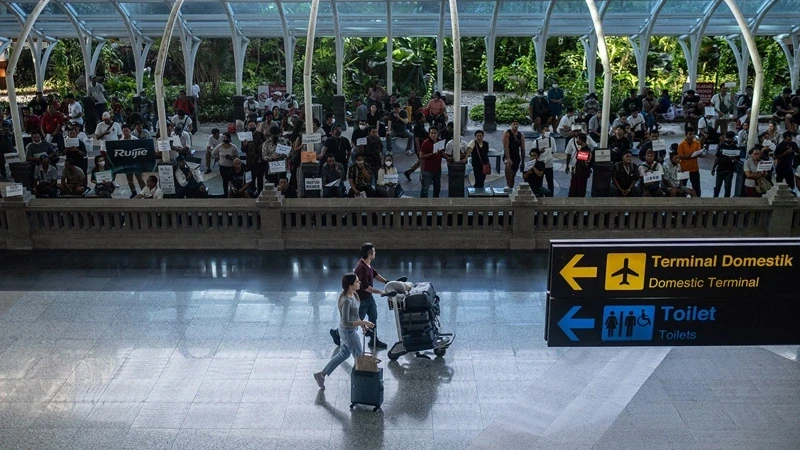On the eve of the high season, when the number of guests from all over the world in Bali breaks records again, the island's authorities have once more raised concerns about the "quality of foreign tourists."

Local residents and officials are dissatisfied due to violations committed by foreigners. One of the latest outrageous incidents involved a drunken foreigner causing a disturbance in the middle of Sunset Road. A viral video shows an aggressive man attacking a woman riding a motorbike, causing her to fall to the ground.
In light of this, Acting Governor of Bali Sang Made Mahendra Jaya made new statements this week regarding the inappropriate behavior of foreigners in Bali. He insists on stricter measures against those who cause problems in the province.
“We want punishments to be fully enforced, not partially.”
The Acting Governor acknowledged that the province's economy relies on the tourism sector and added that it has started to grow again after the pandemic. However, Jaya wants to nip problems in the bud and urges not to hesitate to apply the full force of the law to foreigners who break it.
The statements made by the politician were supported by the Director of Tourism Marketing at the Ministry of Tourism and Creative Economy, Dwi Marhen Yono. He announced that the department is working with the immigration department to create new rules for tourists in Bali. Additionally, it was revealed that Yono's department is consulting with immigration authorities on how to tighten the enforcement of existing visa and immigration laws.
Previously, the Bali Tourism Industry Association called on the island's authorities to revise the current visa-on-arrival policy. The head of the department, Ida Bagus Agung Partha, stated: “We used to be too hospitable; now we will be stricter and screen incoming tourists... we are ready to tighten visa issuance rules.”
In effect, Bali authorities now want to control not only the number of guests arriving in the country but also their quality. However, apart from talking about stricter enforcement of existing rules, regulations, and laws, neither Acting Governor Jaya nor the Ministry of Tourism and Creative Economy have outlined what these tougher measures will look like in practice. One new initiative is the cooperation between the Bali Provincial Office of Law and Human Rights and village authorities to monitor foreigners' behavior.
Authorities may return to distributing "dos and don'ts" pamphlets, which officers used to place in passports at the airport during visa control. It is noted that this practice yielded positive results, but it was gradually discontinued. Currently, the set of rules is displayed only on electronic banners in the arrivals hall.
Perhaps the most radical method to combat tourist misconduct was proposed by Indonesia’s Minister of Tourism and Creative Economy, Sandiaga Uno. He called for stricter control over alcohol consumption by foreigners, specifically addressing those who serve alcohol to tourists.
"Those who offer drinks must tell tourists when they've had enough. Convince guests not to continue drinking, to maintain control over themselves and the situation, because it can lead to trouble, causing people to do crazy things."
Uno believes that before allowing establishments to sell alcohol, they need special training so that waiters or bartenders can recognize signs of intoxication and stop serving guests in time.
As of now in 2024, Bali's immigration service has deported 135 foreigners from the province, with the most frequent offenders being from Australia, Russia, and the USA. In 2023, 340 people were deported from Bali.
Meanwhile, Wonderful Indonesia, the company that developed the original set of rules, has rolled out updates. These updates are not yet official but will be useful for those who want to have a positive vacation in Bali.
One section of the guide focuses on respecting temples, rituals, traditions, and ceremonies. It specifically states: "Balinese rituals and holy days are present in everyday life in Bali; you are obligated to honor and respect the Balinese region, sacred customs, and traditional ceremonies by dressing appropriately, especially in sacred places, covering your shoulders and the area below your knees. Behave respectfully, especially in revered places; consider traveling with a licensed guide to gain more insights."
Wonderful Indonesia also advises "renting vehicles only from licensed companies."
"If you are driving yourself, make sure you have a valid driver's license and wear a helmet when riding a motorcycle. If you have no experience with off-road driving, conduct research before setting off."
The following points appeal to common sense. They advise tourists to "use official money exchange services" and "choose official accommodations for their stay," as well as to know and follow the rules and guidelines in tourist areas for everyone's benefit and comfort.
The prohibitions section is also quite straightforward: it advises not to enter the main areas of sacred places unless dressed appropriately, such as in traditional Balinese clothing with covered shoulders and knees and a sarong.
"Never enter temples and sacred places if you have an open wound or are menstruating. Never climb sacred trees. When in sacred places, turn off your flash and shutter sound. Only take photos if you are permitted to do so."



You can add one right now!